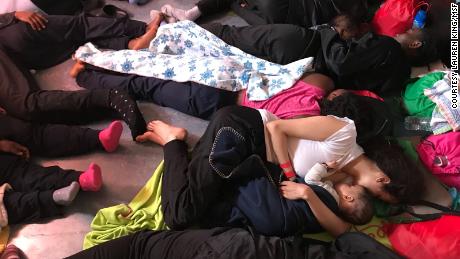What it's like on board the migrant ship to Spain
Updated 1002 GMT (1802 HKT) June 17, 2018
(CNN)Hundreds of migrants who were left to drift in the Mediterranean after Italy and Malta turned them away arrived in Spain on Sunday, ending, at least temporarily, a political crisis in Europe over policing the continent's southern border.
The rescued migrants and refugees were traveling on three ships: the Aquarius, operated by the charities SOS M├®diterran├®e and M├®decins Sans Fronti├©res (MSF), an Italian naval ship and an Italian coastguard vessel.
Aquarius, which was originally carrying more than 600 rescued migrants, was left stranded in the Mediterranean for two days after Matteo Salvini, Italy's hardline interior minister and leader of the anti-immigration League party, refused to allow it to dock last Sunday. After Spain offered to take in the survivors, the ship started an 800-mile journey to the city of Valencia along with the two Italian ships, which were sent to ease the overcrowding.
Here's what the journey has been like for those on board:
Wednesday, June 13
Conditions on board the Aquarius worsened on Wednesday as poor weather and large waves caused dozens of people to suffer from seasickness.
At least 80 people who were pulled out of the sea by rescuers over the weekend had to be treated by doctors as waves as much as four meters high and winds of 65 kilometers per hour buffeted the vessel, according to Doctors Without Borders (MSF), which operates the rescue ship alongside SOS M├®diterran├®e.
That included pregnant women and a mother "who was breastfeeding her baby while vomiting at the same time," Aloys Vimards, MSF project coordinator on board the Aquarius, told CNN.
"In the evening, we had to move the men sleeping on the outside deck to the shelter usually reserved (for) women and children, for safety reasons," SOS M├®diterran├®e's Julie M├®lichar told CNN.
Around 250 people were transferred from the Aquarius to the Italian Navy's Orione and a further 274 to the Coast Guard vessel Dattilo, SOS M├®diterran├®e said.
Thursday, June 14
The bad weather forced the vessel to change course along the eastern coast of Sardinia in company with ships from the Italian Coast Guard and Navy.
"This course should shelter the ships from the worst of the weather," Vimards told CNN.
"We have just finished a morning food distribution for everyone of oranges, cereal bars and croissants with some iced tea. This is the food we received from the Italian Coast Guard yesterday to resupply us. People are still feeling very unwell as a result of the sea conditions," Vimards said.
That night, the Aquarius received supplies from the Italian Coast Guard, including nuts, dried bananas, dehydrated soups and toys for the children.
The weather was warm throughout the day. "Many people were on the deck looking at Sardinia on the background, playing chess, or sleeping outside on the floor," SOS M├®diterran├®e's Julie M├®lichar told CNN. "It was the first land they saw since they left Libya last Friday. Most people were asking what it was, why couldn't we go there."
Despite the calm weather, the rescued people were exhausted, many asking how many more days of navigation are left and when they will reach Spain, M├®lichar said. "They've been at sea for six days now," she said. "One day on the riverboat, five on the deck of the Aquarius and before that months or even years in the hell of Libya."
Friday, June 15
The Aquarius started to sail away from Sardinia, leaving behind the island of Asinara. The weather worsened overnight after calming down on the previous evening.
Doctors Without Borders did breakfast distribution with food that was delivered by the Italian Coast Guard.
"People were starting to feel seasick again this morning with the MSF medical team again bust handing out seasickness medications," Aloys Vimards, MSF project coordinator on board the Aquarius, told CNN.
The Aquarius is expected to dock in Valencia on Sunday morning.
MSF and SOS M├®diterran├®e were also told of two people who are missing and presumed dead.
"These 2 men, Sudanese & Nigerian, lost their lives during a critical rescue at night time," SOS Med tweeted.
MSF shared the story of one of the men who was rescued from the water. Ibrahim, 20, said he went to Libya for work but on his arrival was auctioned off.
The owner got drunk, he is quoted as saying. "He came and took some other black men to his truck, and shot them. A friend and I had to pick up the bodies and bury them."
Saturday, June 16
The Spanish island of Menorca can now be seen in the distance from the boats, MSF Spain said.
The Spanish Red Cross shared details of its preparations for the expected arrival Sunday of the three vessels, which will dock in Valencia at intervals of three hours to help manage the process. Pregnant women and those who are sick will be taken to local hospitals.
MSF tweeted that its midwife on the Aquarius was helping to care for the pregnant women on board after their rescue from the sea.
Children on board the ship were pleased with the toys delivered the previous day, it added.
Sunday, June 17
There was relief and joy among migrants on board the first of three ships to arrive at Valencia harbor.
The Italian Coast Guard bessel Dattilo arrived just before 7 a.m. Sunday morning and was due to be followed by the Aquarius and an Italian navy ship.
Applause could be heard on board the first ship as it docked.
Medical staff in white overalls, gloves and masks immediately boarded the boat to carry out first medical checks.
The migrants, mainly from Africa, were welcomed by a team of more than 2,300 people, including 1,000 Red Cross volunteers, 600 police officers and 400 translators, according to local authorities.






